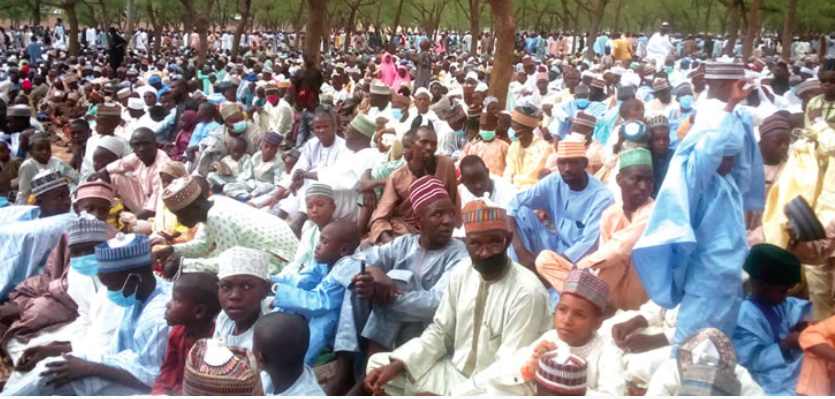Despite the directive by the Sultan of Sokoto, Alhaji Sa’ad Abubakar, and the Presidential Task Force on COVID-19 that there should be no large gathering at Eid prayer, Muslim in Kano, Katsina, Borno, Zamfara and Bauchi states ignored the directive and held prayers at Eid grounds and Mosque.
In a statement by its Deputy Secretary General, Prof Salisu Shehu, the NSCIA said massive gatherings at one Eid ground in a big city should be avoided. “Rather the Eid could be performed in area mosques to avoid unmanageable crowds,” it stated.
On Thursday, Jama’atu Nasril Islam, also led by the Sultan, directed Muslims to observe Sallah prayers at home
In a statement by its Secretary General, Dr Khalid Abubakar, the JNI said, “Eid-el-Fitr congregation on the outskirts of towns and cities should be temporarily suspended.”
It also directed that “Eid-el-Fitr prayer be observed at home with family members or alone in case there isn’t anyone with him or her, at home.”
At the press briefing of the PTF on Thursday, its Chairman, Mr Boss Mustapha, advised against large gatherings of people during the Sallah celebration.
In Kano State, it was reported that Muslims faithful came out as early as 8:30am to observe the Eid-el-Fitr prayers at the various Eid praying grounds without complying with the physical distancing order or wearing of face mask.
It was observed that while some worshippers wore face masks, others refused to abide by the order.
However, worshippers were asked to wash their hands and use of sanitizes, but some worshippers entered the prayer grounds without washing their hands and using sanitizers..
The Chief Imam of Sasif Friday Mosque in the Gama area in the Kano metropolis, Sheikh Mohammed Yahya, said their decision to observe the Eid prayers despite the danger was borne out of the fact that Eid ground was one of the places where prayers could be answered.
Another Muslim leader, Sheik Abubakar Umar, said their decision to obey the state government order was informed by the fact that Muslims could use the occasion to seek God’s intervention.

In Katsina State, the situation was the same as in Kano as the Emir of Katsina, Dr Abdulmumini Usman, was at the Kofar Guga Eid prayer ground where he and many Muslims in Katsina observed prayers to mark the end of fasting.
In Borno, the Eid prayer was held at the Ramat square and was attended by the Borno State Governor, Prof Babagana Zulum.
Although efforts were made to maintain social distancing, it was difficult to implement in areas where there were no government officials because of the crowd that thronged the prayer ground.
In Bauchi State, residents failed to observe social distancing at Eid prayers held in Juma’at mosques. In the mosque, it was noticed that only the prominent personalities observed social distancing and wore face masks.
But the situation was quite different outside the mosque. No social distancing was observed by the worshippers outside. The majority of them did not wear face masks and observed other protocols set by the PTF.
Some of them after the prayers, shook hands and exchanged pleasantries with friends and loved ones.

